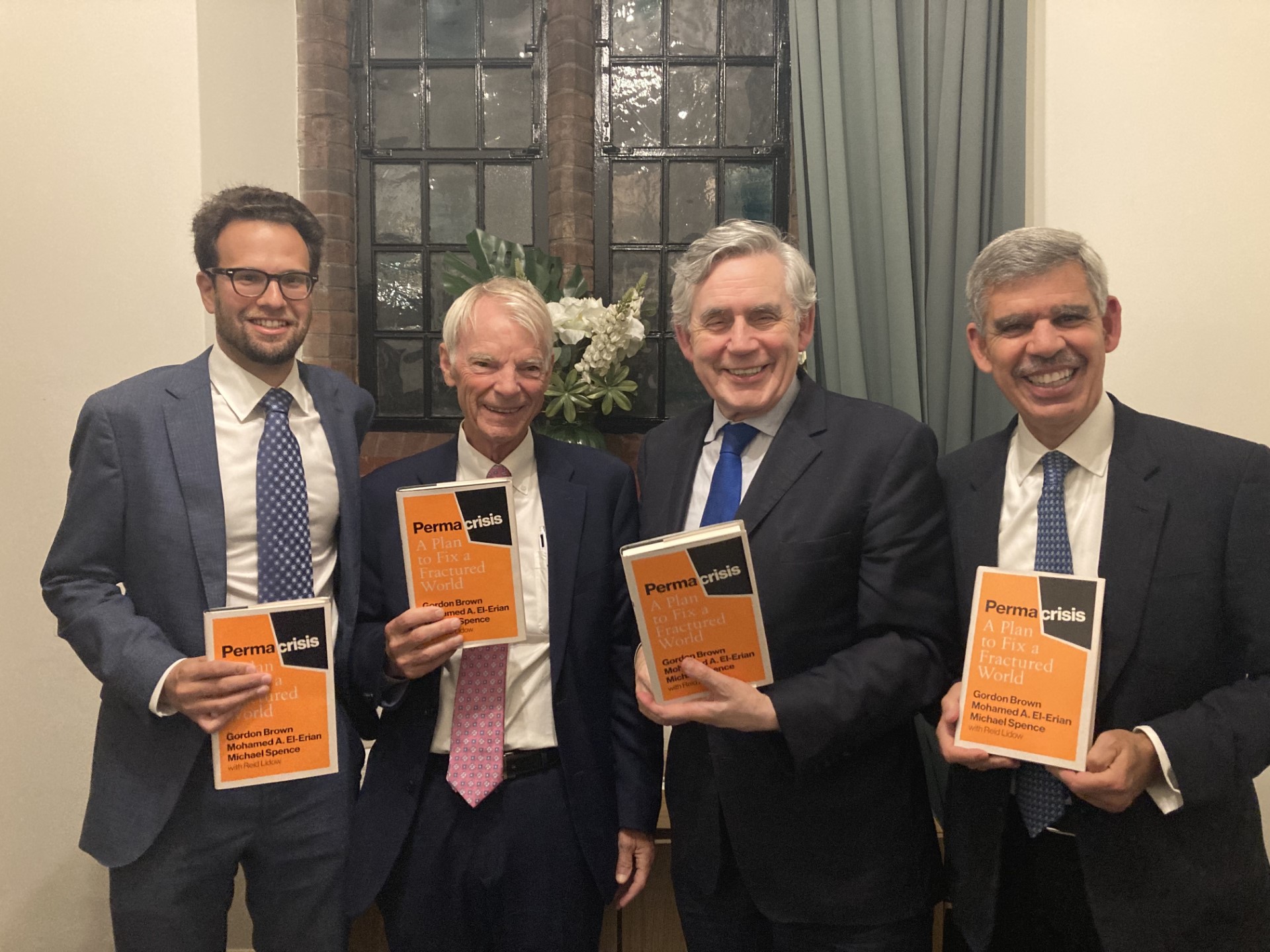
A launch event for a new book outlining a way out of the 'permacrisis' took place in Cambridge this week
Two of the world’s leading economic thinkers spoke of the urgent need to grasp opportunities presented by technology, biomedical and energy revolutions as they launched a new book outlining their ‘plan to fix a fractured world’ at an event in Cambridge this week.
Mohamed A. El-Erian, president of Queens’ College, Cambridge, and Nobel Laureate Michael Spence, joined Professor Diane Coyle to launch the book, Permacrisis: A Plan to Fix a Fractured World. The book is based on conversations between the authors, a group that also includes former UK Prime Minister Gordon Brown and Gates Cambridge Scholar Reid Lidow [2014].
El-Erian said the book emerged out of weekly Zoom calls during the pandemic as they worried about the future of their children and that some of the things that were happening could make that future worse. The list of concerns ranged from growing inequality exacerbated by the pandemic, to rising inflation in its aftermath, years of stagnant productivity, and the increasing chaos caused by the climate change emergency. Every Zoom call was a learning opportunity as the authors shared their perspectives and explored pathways out of the permacrisis.
Turning vicious cycles into virtuous ones
The book is their attempt to set out a set of positive and feasible measures that are capable of turning vicious cycles to virtuous ones. ‘Permacrisis’ focuses on some of the key factors that have contributed to those vicious cycles, such as our inability to grow in an inclusive way that respects the planet; repeated policy mistakes that make things worse; a lack of cognitive diversity in policymaking; a tendency to look back rather than forward; a lack of accountability in central banking systems, particularly in the US; a tendency to use the financial system to address structural problems which encourages excessive risk taking and resource misallocations; and a lack of global coordination and sharing of best practices. Policymakers had got good at dealing with crises, said El-Erian, but not at sustainably emerging well from them or stopping new ones . They had “won the war, but lost the peace”.
Spence explored some of the challenges stunting growth, including an ageing population in many countries, a long period of demand-constraints, declining productivity since the internet surge at the end of the 1990s, rising debt, increasing interest rates and the constant threat of inflation. But, he said, the book presented a ‘silver lining’ based on three ongoing revolutions: a digital transformation underway now – as witnessed by recent Artificial Intelligence strides – that have the potential to boost productivity if used correctly; biomedical and health science advances; and the massive energy transition required for sustainability.
Spence is optimistic that people will act when they understand the opportunities before them, for instance, from alternative energy sources waiting to be tapped more fully, to the power of AI to augment – not fully automate – our work.
Building momentum for a feasible alternative
El-Erian said the innovations we are seeing now are different from those in the past which had not delivered the necessary positive transformations to get the world out of perpetual crisis. Today’s innovations have been “turbo charged” and go far beyond the prior limits of digitisation. He gave the example of education, saying people anywhere could have “a tutor in their pocket”, dynamically tailored to them, which would revolutionise how we learn, level the playing field and unlock more possibilities if we are open to and adapt to it.
He added that we have run down our human and financial resilience through the permacrisis – and, with that, our ability to get up and rebound after each new crisis. If there is broad understanding that the path we are on is getting worse and if we can build momentum for a feabile alternative, we should, he said, be able to convince people of the need to act in the common interest, adding that that shift has the power to end today’s permacrisis.
*Permacrisis – A Plan to Fix a Fractured World‘ is published by Simon & Schuster. Picture: all the authors at the book’s launch event in London.












